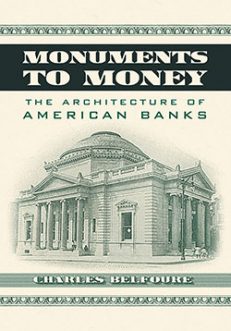Subtotal: $39.95
Monuments to Money
The Architecture of American Banks
$39.95
In stock
About the Book
To understand the evolution of bank design, it is also necessary to grasp the fundamentals of America’s banking and financial history, which go hand-in-hand with the creation of bank architecture. While the worldwide evolution of architectural styles played a major factor in the way banks look, developments in the financial history of the nation—depressions, panics, government monetary and banking policy—also played a critical role.
With more than 200 photographs and illustrations, this work studies the evolution of American bank architecture from 1781 (when America’s first bank was founded) to new banks of the present day. It explores how and why the classically inspired structures built in late 18th century America, embodying strength and trust, evolved into the essentially anonymous bank buildings of today.
About the Author(s)
Bibliographic Details
Charles Belfoure
Format: softcover (7 x 10)
Pages: 358
Bibliographic Info: 222 photos, notes, bibliography, index
Copyright Date: 2012 [2005]
pISBN: 978-0-7864-6413-5
Imprint: McFarland
Table of Contents
Acknowledgements vii
Preface 1
Introduction 5
1. The Early Republic: Neo-Classicism and the Federal Style 9
2. The Jacksonian Age: The Greek Revival 42
3. The Gilded Age: Victorian Eclecticism 70
4. The Turn of the Century: The Classical Revival 125
5. The Early Moderns: Sullivan and the Prairie School 194
6. The Great Depression: Modern Classicism 212
7. Postwar Prosperity: Modernism 244
8. The Twenty-First Century: Financial Department Stores 289
9. New Uses for Banks 308
Notes 315
Selected Bibliography 329
Index 333
Book Reviews & Awards
“banks were built impressively…to convince customers their investments were solid and their savings secure…provides many photos and line drawings”—C&RL News.

 Rudyard Kipling and Sir Henry Rider Haggard on Screen, Stage, Radio and Television
Rudyard Kipling and Sir Henry Rider Haggard on Screen, Stage, Radio and Television 




